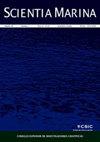Psychedelics sea slugs: Observations on colour ontogeny in two nudibranch species from the genus Nembrotha (Doridina: Polyceridae)
IF 0.9
4区 生物学
Q4 MARINE & FRESHWATER BIOLOGY
引用次数: 0
Abstract
In recent decades, thanks to the use of integrated taxonomy, the traditional recognition of a nudibranch species based on observation and colour pattern variation has become increasingly questioned, mainly due to the presence of cryptic and pseudocryptic species complexes. Individuals with the same colour pattern can be genetically identical, but individuals with different colour patterns may also be genetically identical and this variation may instead represent different life stages. But things can get even more complicated. What happens when the same species changes its colour pattern radically as it ages? Here we present two extraordinary examples in species of the genus Nembrotha based on laboratory observation. Specimens of Nembrotha livingstonei Allan, 1933 and Nembrotha yonowae Goethel and Debelius, 1992 were collected in Mozambique and kept in captivity as long as feeding was possible. The results showed that colour patterns in both species changed over time and that this change was linked to diet. Furthermore, species delimitation analysis and comparison of the uncorrected COI pairwise distances of examined specimens from Mozambique and others downloaded from GenBank confirmed that N. yonowae Goether and Debelius, 1992 is a junior synonym of N. cristata Bergh, 1877. Similar studies with laboratory observations are needed on other species of the genus, as they were described on the basis of different colouration, but integrated taxonomy may show different results.致幻海蛞蝓:两种海蛞蝓属裸鳃海蛞蝓的颜色个体发育观察(海蛞蝓目:海蛞蝓科)
近几十年来,由于综合分类学的使用,传统的基于观察和颜色模式变化的裸目物种识别受到越来越多的质疑,主要是由于存在隐种和伪隐种复合物。具有相同颜色图案的个体可能在基因上是相同的,但具有不同颜色图案的个体也可能在基因上是相同的,这种差异可能代表不同的生命阶段。但事情可能会变得更复杂。当同一物种随着年龄的增长而彻底改变其颜色图案时,会发生什么?在这里,我们提出了两个非同寻常的例子,在物种属Nembrotha基于实验室观察。1933年出生的Nembrotha livingstonei Allan和1992年出生的Nembrotha yonowae Goethel和Debelius的标本是在莫桑比克收集的,并在可能的情况下被圈养。结果表明,这两个物种的颜色模式随着时间的推移而改变,这种变化与饮食有关。此外,对从GenBank下载的莫桑比克和其他标本的未校正COI配对距离进行物种划分分析和比较,证实N. yonowae Goether和Debelius, 1992是N. cristata Bergh, 1877的初级同义词。由于该属其他种的描述依据不同的颜色,需要对其进行类似的实验室观察研究,但综合分类可能会显示不同的结果。
本文章由计算机程序翻译,如有差异,请以英文原文为准。
求助全文
约1分钟内获得全文
求助全文
来源期刊

Scientia Marina
生物-海洋与淡水生物学
CiteScore
2.10
自引率
0.00%
发文量
21
审稿时长
6-12 weeks
期刊介绍:
Scientia Marina is the successor to Investigación Pesquera, a journal of marine sciences published since 1955 by the Institut de Ciències del Mar de Barcelona (CSIC). Scientia Marina is included in the Science Citation Index since 1998 and publishes original papers, reviews and comments concerning research in the following fields: Marine Biology and Ecology, Fisheries and Fisheries Ecology, Systematics, Faunistics and Marine Biogeography, Physical Oceanography, Chemical Oceanography, and Marine Geology. Emphasis is placed on articles of an interdisciplinary nature and of general interest.
 求助内容:
求助内容: 应助结果提醒方式:
应助结果提醒方式:


